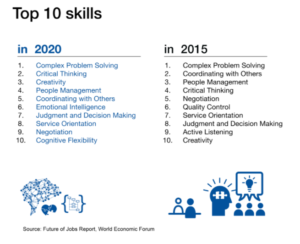Here we are, standing on the edge of the fourth industrial revolution and we’re all trying to figure this out. Never before has an industrial revolution had the potential to disrupt the global economy like this one.
It’s not a case of following a guidebook for success- in fact, the guidebook should be thrown away entirely.
In their report, The Fourth Industrial Revolution is here- are you ready?, the Deloitte Insights team advises companies on the major trends they can harness to develop and execute innovative approaches to better serve their customers.
1. AI: The bots are back
Artificial Intelligence (AI) is undoubtedly the biggest game-changer in the new wave of technology. While we’ve all come to accept that data is paramount to success, AI is now able to surpass human level capability to quickly deriving insights from large volumes of data. One glance at the most hyped startups at Web Summit 2017 will tell you all you need to know: AI is transforming life as we know it.
2. Who can do it? Automation!
Based on a study of the workforce in 46 countries, McKinsey Global Institute concludes that almost half of jobs have the potential to be automated by 2055. It is believed that highly skilled workers will be largely unaffected, but those workers in low and middle-skill jobs will be faced with job losses and the need to upskill.
3. Social impact of Industry 4.0
This widening gap in skills has the potential to lead to further social inequality. However, 87% of executives believe that the fourth wave will actually increase equality and stability, because business will have greater influence in shaping the future, rather than government regulation. Just look at the cryptocurrency marketplace- governments are scrambling behind to regulate it.
4. The changing workforce
It is estimated that over one-third of skills (35%) that are considered important in today’s workforce will have changed by 2020. Creativity is the key skill that will jump highest in the most desired traits of employees. While AI can do the job faster, robots aren’t as creative as humans. There is no point in giving workers this avalanche of new technology if they can’t creatively figure out how to use it.
5. Shifting strategies
There is a distinct lack of confidence among executives that they are ready to embrace the opportunities associated with Industry 4.0. While they are focussed on traditional business operations, the future belongs to those who innovate and create new value for their stakeholders. This is where UpThink can help. We collaborate with clients to create bespoke innovation strategies to disrupt the ordinary in an organisation’s mindset, processes and culture.
Contact hello@upthink.works to take the first steps in shifting your strategy for Industry 4.0.
This article was written by Laura Cronin, UpThink contributor.
Categories:
Innovation
April 7, 2018

